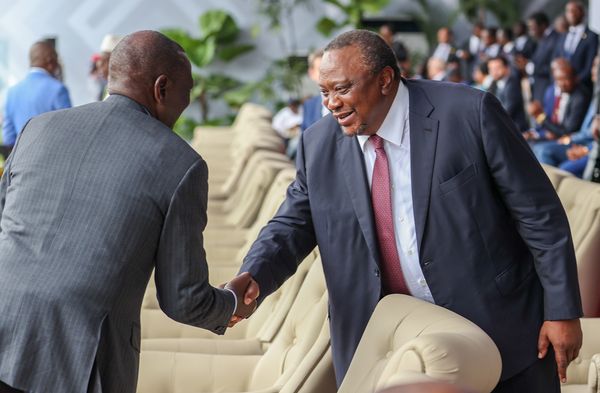By Otiato Guguyu
He had directly been involved with the conceptualization of the Eurobond post-2008 crisis, its inaugural issue when he became President in 2013 and had been responsible for the aggressive procurement of debt over the last decade. Kenyatta had then handed his deputy the poisoned chalice and watched him choke over it.
Kenya’s former president Uhuru Kenyatta’s defeat at the hands of his spurned deputy was complete.
No one captured this humiliating capitulation better than Dennis Galava, one of my former editors, who incidentally was sacked at Mr Kenyatta’s behest in 2016 when he penned a bruising editorial against the Jubilee administration.
As Mr Galava put it, President Kenyatta’s political career started with rejection and rebellion and ended in rebellion and rejection. Mr Kenyatta, the failed Kanu era project, had a dejà vu moment when his presidential endorsement, opposition leader Mr Raila Odinga was rejected at his hometown and the Central Kenya region at large, home to his ethnic Kikuyu community.
A drunk or political scientist?
Many people, including myself, have often underestimated the economics and political science graduate from Amherst College, assumed to have lived off a silver spoon as the scion of the first Kenyan president and under the godfathership of the second president.
His ally’s including Raila Odinga, and his deputy William Ruto, openly called him a drunkard and easy to manipulate almost taking credit of his successful two terms as President.
But as history evolves and Kenya regrets President William Rutos’ tenure, Mr Kenyatta may go down as a political genius or simply lucky.
He has evolved his Kikuyu community from being isolated in 2007 into an indomitable coalition with the rival Kalenjin community and then built a bridge with an olive branch to the opposition’s Raila Odinga, that his wife Margaret Kenyatta was invited to Jaramogi Oginga Odinga’s memorial service in Kisumu where his people had been molested and expelled just one and a half a decade ago.
The return of Kenyatta
After a yearlong political hiatus, former president Uhuru Kenyatta made a public appearance on November 19 at a church function in the backyard of opposition coalition Azimio 2027 presidential hopeful Kalonzo Musyoka.
The former president, who could not even muster a win in his home constituency during the last election, was treated as a kingmaker.
Politicians allied to Mr Musyoka fell over each other to elevate Kenyatta’s achievements during the rare public appearance, as it became clear they wanted an endorsement.
Puffing healthily out of his signature African print shirt while attending a church service in Mwingi County, Kenyatta revelled in political praise for the development projects he built during his time and the validation of rejecting his deputy for the top job.
Kitui Senator Enoch Wambua said that Uhuru’s presence at the event was enough endorsement for Kalonzo’s presidential bid, adding that Raila Odinga had recently endorsed the former vice president for the top seat.
The former president had come full circle in just one year, from losing to his deputy in the 2027 general elections when President William Ruto floored his preferred candidate, Odinga, to a visionary leader who seemingly predicted Kenya’s current socio-political crisis.
“I have heard all that you have said. Who knows, only God knows,” President Kenyatta said caressing the hilt of his double-barreled microphone like he was wont to do over the last decade when everyone hung on his words as the country’s number one.
Pyrrhic victory
His exit had been embarrassing, Mr Kenyatta had lost touch with his ethnic Kikuyu community and his endorsement lost in all of his vote-rich Mount Kenya backyard, including Mutomo Polling Station in Gatundu, where he had cast his vote on the morning of August 9.
The rejection cut deep, and Mr Kenyatta looked beaten when he announced he would “hand over power smiling because it is constitutional. Aluta continua but I will leave knowing Raila is my leader.”
The new administration rubbed it in with Deputy President Rigathi Gachagua mocking the exiting president who sat pensively powerless during Ruto’s inauguration and then quietly disappeared from public life.
A year into the new government that has unleashed unprecedented tax measures in the middle of a global recession, drought and El Nino, the very same people who had rallied to send Mr Kenyatta to Ichaweri, the family home for retirement, are now regretting, praising his rule and elevating him back to the crest of Kenya’s politics.
Mr Kenyatta now looks like a political genius who predicted his deputy’s incapacity to handle the state machinery and its overwhelming challenges.
While handing over power in his 38-page valedictory speech, Mr Kenyatta had counseled for policy coherence repeating ‘unbroken chain’ 15 times as an appeal for the wisdom of previous governments.
President William Ruto had campaigned against Kenyatta’s policies on security, tax revenues, social safety nets and even operations of Kenya’s most expensive piece of infrastructure, the Standard Gauge Rilway (SGR). Unwinding them and dismantling his administration’s structures, and blaming the previous government for the macroeconomic crisis.
The blame game has become ridiculous after a year of new tax measures, borrowing from the International Monetary Fund-backed program, and a tempest of external shocks that have hiked inflation, gutted incomes, and made Ruto a very unpopular president with a narrow mandate.
Faced with policy failures, disintegration of social fabric and worsening economy the blame game is being written off as excuses, and President Ruto has lost his supposed genius that outwitted the dynasties.
Cover Photo: Office of the 4th President of Kenya.
This article was first published by Orals East Africa. The author is a Kenyan freelance journalist covering business and politics.



